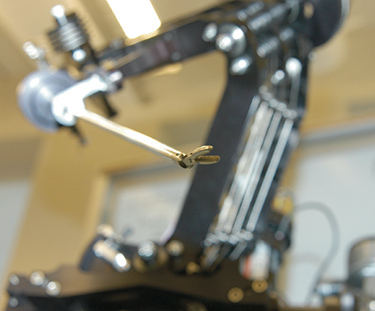Beer provides inspiration for ‘Science on Tap’
 The parking lot of Ravenna Third Place Books is full to overflowing, but the store itself appears deserted. Everyone, it turns out, has packed into the basement pub, where Blake Hannaford is answering questions about the robot surgeon he’s been building.
The parking lot of Ravenna Third Place Books is full to overflowing, but the store itself appears deserted. Everyone, it turns out, has packed into the basement pub, where Blake Hannaford is answering questions about the robot surgeon he’s been building.
The event is “Science on Tap,” a monthly opportunity for folks from the community to get together on a Monday evening and listen to a distinguished scientist while sipping beer. No questions are off-limits, and no jargon is allowed—a tough rule for Hannaford to observe, he admits. Most of his funding comes from the military, “and they love jargon.”
A professor of electrical engineering at the UW, Hannaford has for several years been developing a machine that will enable surgeons, with the help of the Internet, to treat patients thousands of miles away—on battlefields, in disaster zones, in remote locations, even in space.
An audience member points out that in the course of his research Hannaford must have gathered vast quantities of data about the way surgeons work. Is it possible we’ll reach a point, he wonders, where the human surgeon becomes unnecessary? There are a few skeptical laughs from the audience. “I don’t mean in my lifetime,” the questioner adds.
“Not in your lifetime, not in my lifetime,” Hannaford replies. “I think our lifetimes would be a lot shorter” if people did turn their critical care over to robots any time soon.
And yet, he says, there’s no reason to believe that it won’t happen in due course. “Why not? Imagine the way today’s surgery would look to a surgeon even a hundred years ago.”
Someone else starts in on a question, but gets only as far as “motor skills” before a pint glass crashes to the floor somewhere in the back of the bar.
Hannaford smiles. “Speaking of motor skills…”